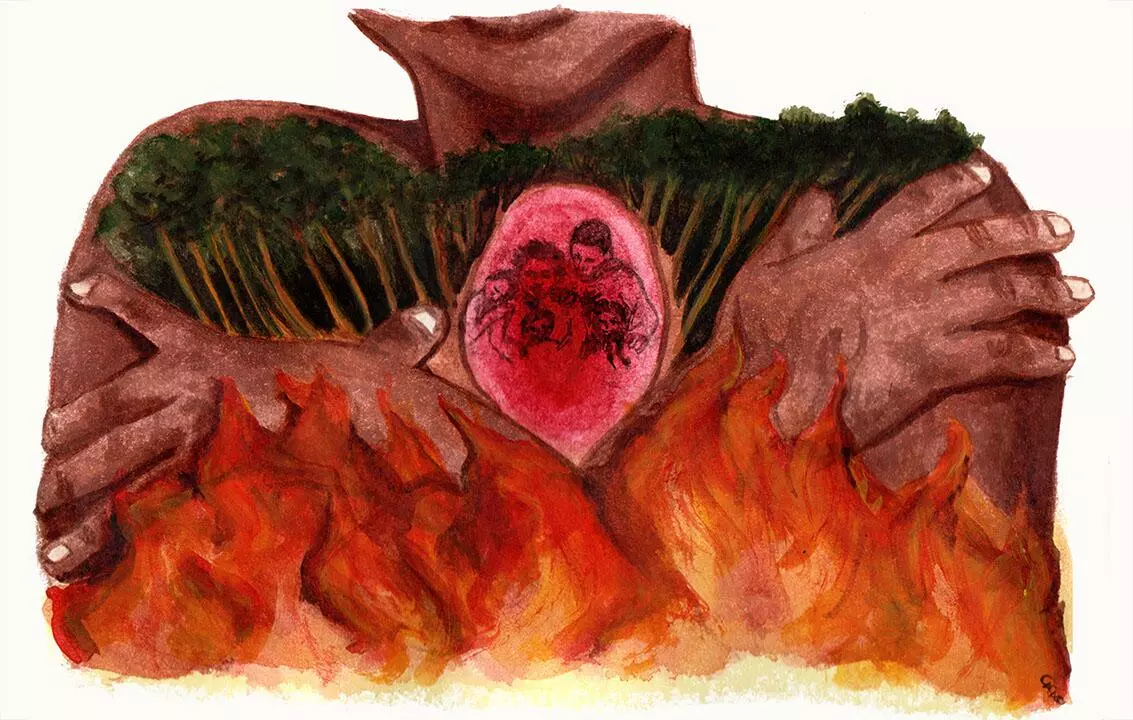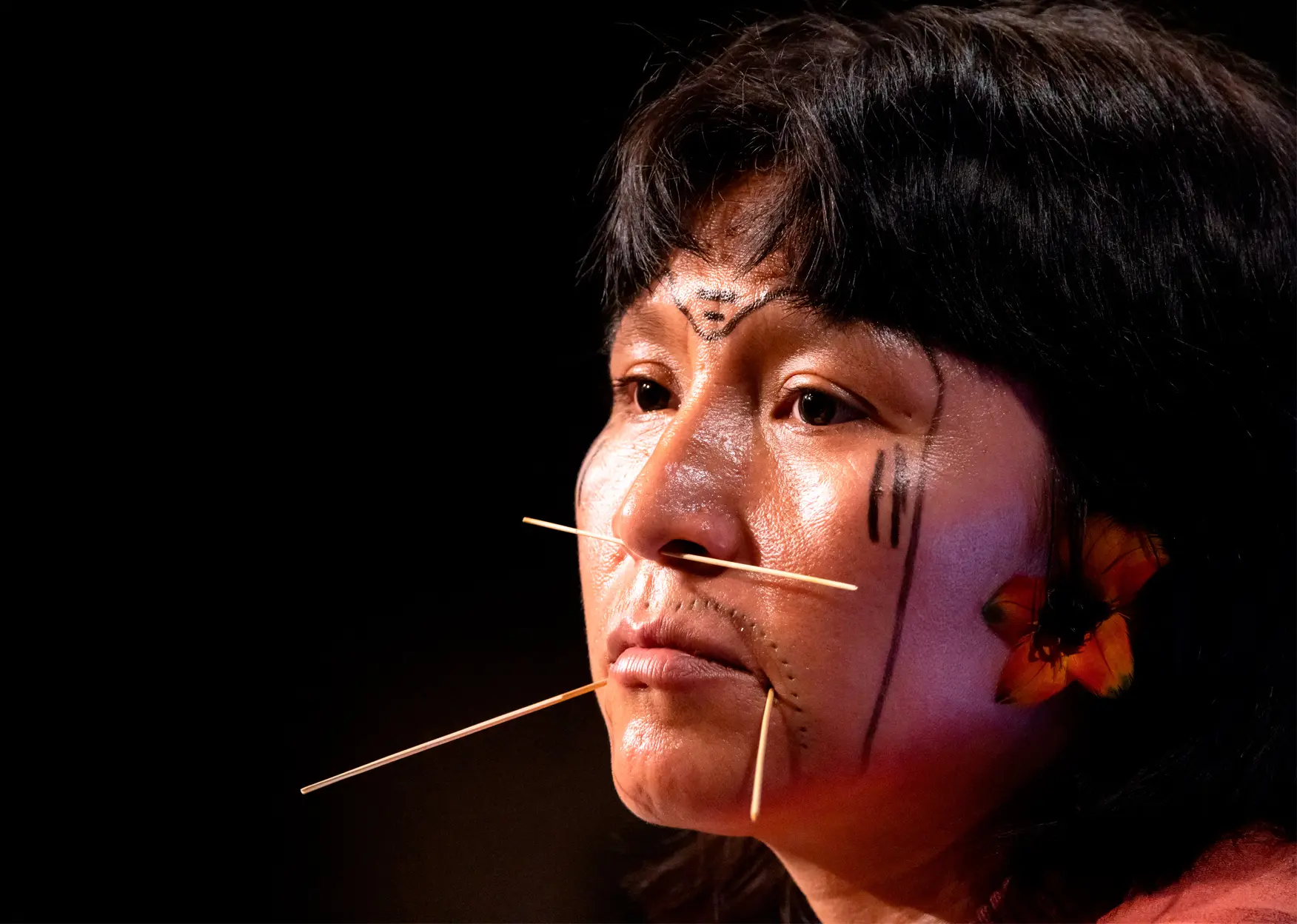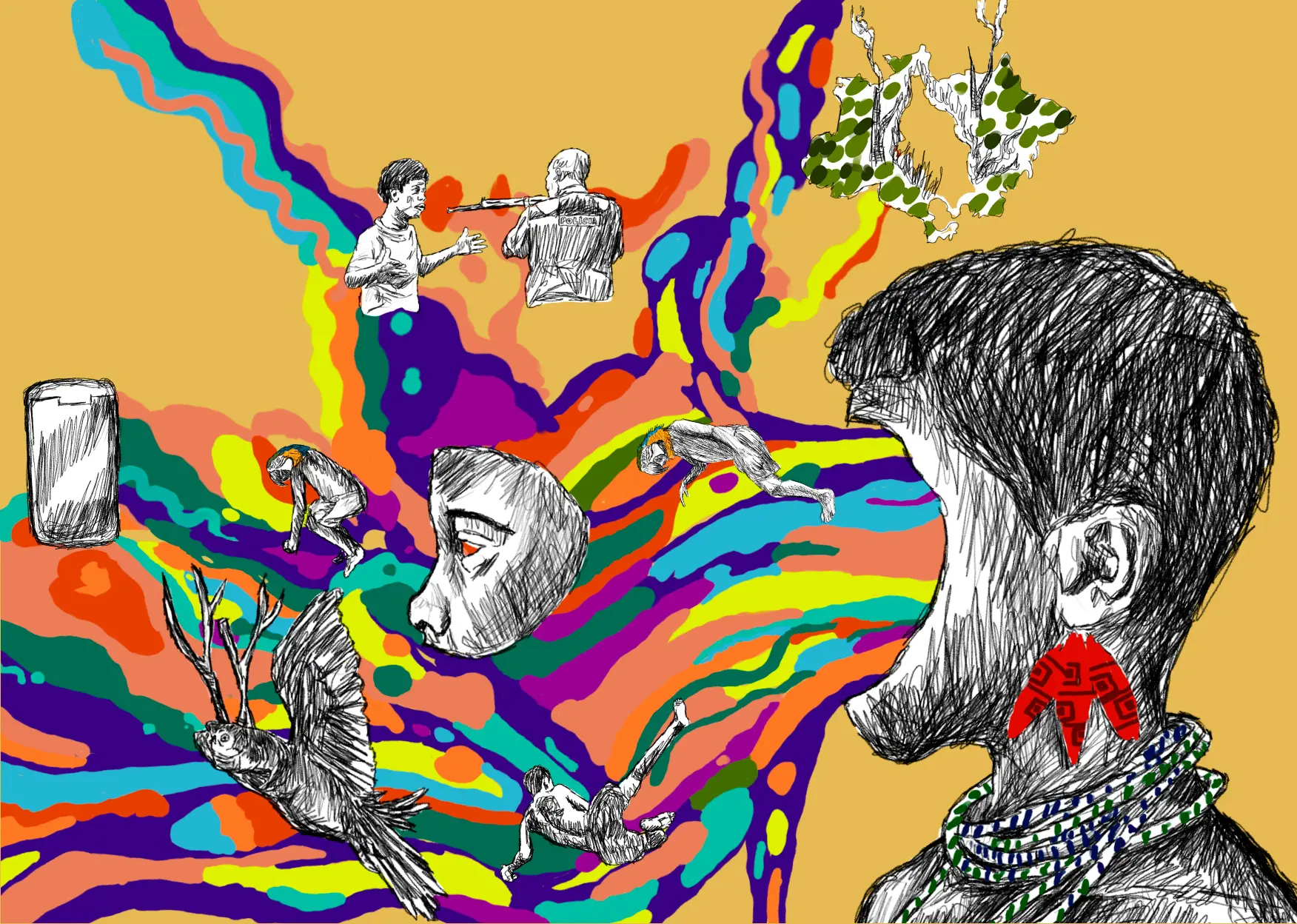My name is Natalha Theofilo and I am a refugee in my own country. I am Quilombola, 33 years old, a black feminist, human rights activist, and forest defender. I am part of the forest people. I am writing to you from exile, to which I was condemned along with my husband, the peasant leader Erasmo Theofilo, and our four young children. Our exile is not in Paris, London, New York, or Berlin. Our exile is inside Brazil, where we are hidden so a bullet doesn’t blow off our heads or those of our children. That is how we spent the first round of this election; hidden so we aren’t killed. When we saw the results, we were pained to know 51 million Brazilians voted for the one who condemned us to the horror of living with a target on our heads for defending the Amazon and agrarian reform.
For me, there was one Brazil before the 2016 coup and another Brazil after the coup. Before, we were experiencing a thread of democracy. It was far from ideal, but yes, it was still democratic. We knew we had a lot of work ahead of us, but we were ready. I started to give hair braiding workshops to black girls, using the braids to strengthen them. I lectured on the empowerment of black women and said: no one is going to give us power, we have to take it. We need to study. We need to open the doors and windows. We need to be together. We need to be strong, but not just to resist being consigned to manual labor. This we already do. We need to get to the place where decisions are made.
Then the coup came. Brazil lost its first female president, Dilma Rousseff and I lost all my jobs. And I had to start getting help to buy food and medicine.
In December 2019, less than a year into Jair Bolsonaro’s term, barbarity had already been unleashed. My community, Lot 96 in Anapu, Pará State, had buried two great leaders of the peasant struggle for agrarian reform. Then there was the first attempt to break into our house and the first attempt to murder Erasmo, my partner. Deeply hurt by the killings, we were there, inside a fragile house, trying to protect our lives. I remember he said, “Will you stay with me?”. I replied: only if it is to live. I don’t plan for death, only for life. So we left Anapu for the first time, not to die. That was on 17 December, 2019.
For the first time in his life, Erasmo spent Christmas and New Year away from his parents. Erasmo cried so much that my chest tightens whenever I revisit these memories. After that, we quickly moved four more times. And today, we are here once again as refugees. Our children have barely gone to school. We are terrified that somebody will do something to them. We recently received messages saying “they would touch Erasmo’ heart”. They would leave him “alive but heartless”. In our region, when you talk about taking someone’s heart, that means killing their children.
When he received this threat, Erasmo was shaken. “If they touch one of my kids, I don’t know what I’m going to do with my life,” he told me. So we asked for a meeting with the program to protect human rights defenders in the state of Pará and with the Federal Public Ministry.
And here we are, refugees, while criminals are on the loose. What is our crime? What is the crime of our children? Having been born poor, having parents who fight for agrarian reform and for the forest to be left alone? And here are our children, without the right to school, incarcerated with their parents when they should be playing and socializing with other children.
Erasmo looks at me with teary eyes and asks: “What are we going to do with our lives? We’ve lost everything”. I reply, full of strength: let’s stay alive. Our children need us alive.
The truth is that inside me, I need to repeat this like a mantra. We must believe that our lives are precious and that we cannot die without leaving our children safe. But how do we keep our children safe if they are burning everything we are?
In captivity, as we are, the pain only increases. The days are usually filled with the children running around the house. Now and then, I see Daniel, aged 8, sitting in some sad little corner. I ask: What is the problem? And the answer is straightforward: “I miss home, I would like to go home. I would like to fish with grandma.”
Daniel is very attached to his grandmother, they fish together, they are partners in adventure, as he likes to say. I lower my head and say I understand his longing, I say that soon we will all be together again.
It’s a big lie. First, I’m not the kind of person who thinks they know the depth of another person’s feelings. I can only imagine this longing he feels is very big because a smile on his face is rare. Second, I don’t know where we are going after we leave this temporary shelter. Most likely, we can never go back, and everything we built and fought for will have to be left behind.
Between jokes and conflicts with Nathan, six years old, little Nathally, who is four, says: “Mom, I want to catch the plane soon, I want to go home. Grandma must already miss us, and so does grandpa”.
If our days are filled with children and their feelings, games, and questions, my nights are torn by crying and anxiety attacks. I walk around the house, watching everyone sleep. Then, Erasmo calls me, and I run to the room and answer: Hi!
He then asks, “Is everything okay?” Yes, I just went to see the kids, I reply. So many nights go by in this insane routine of anguish and anxiety.
I put Dudu, our baby, to sleep on the Friday before the elections. He was born in another refuge. It was a risky pregnancy, and we had to leave in a hurry because of the attempts on our lives. After that, we have taken refuge three more times. Dudu sleeps, and I ask Erasmo: what do you think will happen if Lula wins?
He gets serious and, looking me straight in the eyes, he says: “It will be tough. Power will be distributed to his allies, and most of his allies are enemies of the standing Amazon. In the last debate, almost nothing was said about the Amazon. We are outside. I hope (the indigenous leader) Sonia (Guajajara) is elected, and I hope it’s not just her. There will be struggles, a lot of struggles”.
We have lost so much in these Bolsonaro years. Our friend, Paulo was murdered in front of his son, and the killing of another friend, Márcio left four children orphaned. Everything is being burned, a little girl was raped to death. They burned houses and even the school was set on fire. So many misfortunes, won’t this all stop? I ask Erasmo, with my heart already racing and another anxiety crisis engulfing my body. “I don’t know! I hope so. But as you say, this has all been happening since the invasion of Brazil”. Erasmo continues: “You went to São Paulo and told me that people there say the issue of agribusiness is a simple thing to solve. So that’s it, the mining issue, the indigenous issue, the defenders’ issue… everything is presented as if it were our problem and not that of the whole of Brazil. When or if Lula is elected, everything will remain our problem, as always. Fighting to the end is what is expected of us. But what everyone will do, I don’t know. I will fight as long as I can drag myself along.”
It hurts to hear Erasmo speak, but it’s not the pain of someone who stubbed his toe or stuck his finger in the door; it’s not that kind of pain. It is a feeling that is born from the reality of the uncertainty of existence itself. At the same time, it is the pain of living to fight, because only the fight is certain.
I look at Erasmo and say it’s going to be okay, because I don’t want him to feel what I feel. And at the same time, I imagine he might be thinking the same thing, too. Long and deep hugs are what surround us. I feel like it’s in those moments that we say everything to each other. When, whispering in my ear, entwined in an embrace, he says: “I’m afraid of losing you and of losing myself in pain”.
In those moments, we break into a hug, like an anaconda. Then, when we fall into bed, we fall asleep because the body can’t stand it any longer.
When I’m awake, the real nightmares replay in my head. It’s the pain of a mother who saw the despair of a four-year-old girl, the same age as Nathally, crying and saying that they would set fire to her house and kill her mother, and that’s why her father couldn’t leave them even for a moment. It’s the pain of a black woman who sees another having to abandon everything she has built with her own hands because she can’t stand so much injustice anymore. “If it were me who had burned down a powerful person’s house, I would have been arrested,” she told me in tears. “Or killed”, she added.
Yes, it’s true. It hurts! A pain that rips the throat and takes away the desire to eat. I feel disgusted to live in a country where my children not being in school is the smallest of evils because the alternative is that they could be dead. Now, with my hands shaking as I write, I feel horror. It’s terrible having to write about things that should never have happened and are still happening. But this is the reality. I have a hard time writing about the feelings of Erasmo and the children because I’m aware that I won’t find the right words. How will I describe the feelings of my children who live this horror together with us? The most devastating thing is that I don’t know how to lessen their pain. To go to school, for walks, to make friends with the children close to where we are. None of this is possible.
I wanted to write so many things to you, but I know I won’t be able to because I was built to hide my feelings, so I can’t be seen as the fragile woman I am. Because fragility in black women is weakness. Because we, black women, are required to be strong. That demand is even stronger right now. My children need a strong mother, my partner needs a strong wife. I repeat this out loud as I write and think, I’m strong even though I’m fragile, but that’s just a thought. The tears flow like an act of rebellion, and I wonder why I can’t cry even when Erasmo says I can; why when he cries, I don’t cry; why tears only come when night comes and I feel safe in solitude? “Love, I’m like that too”, Erasmo says, “I’m feeling bad too”. I think he expects me to take words from him as a sign that I can show him all my fragility, but I bravely swallow back the tears. And that’s exactly what I’m doing now.
Why should I describe our experiences to you? Why, day after day, do we, female and male blacks, female and male natives, have to prove the value of our lives? Why don’t our black bodies, like those of relatives, not have the same value as white bodies? Why are our mutilated bodies thrown into ditches, sunk in rivers, left in places no one sees? Why, when we talk about the horror lived in the settlements of Anapu, we must first say that it was in that land that Sister Doroty Stang, a white nun, was murdered. Why is Dom Phillips a reference point for commotion when, inside me, screams the certainty that Bruno Pereira’s body would still be missing today if he didn’t have Dom as an expedition companion, an Englishman, a white man? This is my place of speech, the one of a black refugee woman, reminding you that I exist, that my partner exists, that my children exist, and that we want to live.
Erasmo has an experience of resilience because despite the infantile paralysis that does not allow him to walk, he is kind and strong. I, on the other hand, am a black woman, a feminist, who lives questioning the places that are already occupied, and not by chance, by white people. We meet in our pains. Because it doesn’t matter if we are in the forests, in the rivers, on the stilts or on the slabs of the cities, we, black quilombolas or natives, get closer in our sororities of pain.
That Brazil will never be the same again is a fact. For Brazil to stop dumping our bodies in ditches and rivers is what we’re going to fight hard for, as always. Together, female and male blacks, female and male natives, and whites who know their place in this struggle. And especially learning how to understand that, yes, these struggles only exist because of white people. And we, black people everywhere, have to know that as long as our deaths and lives do not carry the same weight, while they do not cause the same commotion and indignation as the deaths or lives of white people, while our bodies and our ways of life are not seen with the same importance, we will still not be on the right path.
So, yes, when election Sunday arrived, the one when we sheltered in a refuge where the bullets of Jair Bolsonaro’s supporters didn’t reach us, and when 51 million Brazilians voted to reelect Bolsonaro, it felt like my life, Erasmo’s life, and our children’s lives don’t matter.
If electing Lula meant having the right to fight for rights with a lower risk of being murdered, then imagine how terrifying things would become if Bolsonaro were reelected. If Bolsonaro wins, that’s it. It will be the end for many of us, human rights defenders. We, forest people, will be annihilated quickly, even before our mother burns to death. But I need to tell you: everyone will feel our deaths because when the world runs out of air, they will know that the forest people were the way of life.
Here, in exile, in this exile within my own country, I say: I cannot bear four more years like those we have just gone through. I can no longer put up with moving among five refuges. I can’t stand schools being burned. I can no longer endure the knowledge that my children have a gunman’s pistol to their heads. I can no longer tolerate the fact that they cannot go to school. I can no longer bear my partner’s pain. I can’t take it anymore.
I. Can. Not. Anymore.
Natalha Theofilo. Quilombola, black feminist, peasant leader in Anapu (Pará State), Afro-braider
Translated by Luiza Mugnol-Ugarte

Ilustração: Cacao Sousa




